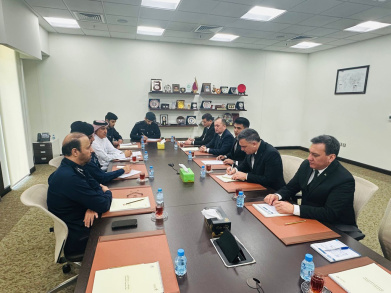Feathered guests – small stories about birds that look like human stories
19.01.2021 | 11:41 |In Ashgabat, there have always been many different kinds of birds, and there are interesting stories in their dialogue with people. I will tell you one of them. One day, two turtle-doves flew to my windowsill.
Having ruffled, protecting themselves from the cold, the turtle-doves, turning their heads to one side, looked at me with eyes tiny compared to their rather large bodies, ready to fly away at any moment.
As per a custom, guests should be offered food. I crumbled bread into a cup, but as soon as I opened the window to pour the food onto the windowsill, the turtle-doves fluttered and sat on the branches of a nearby tree.
I closed the window, but they were still sitting on the branch, not daring to come close to the fare. After waiting for some time, and making sure that the window was no longer opened, and, as if nothing threatened them, the turtle-doves consulted and decided to start their meal.

After eating, they made a turn, flattened their tails against the glass, expressing either a bird’s gratitude or the highest degree of confidence in me, cleaned their feathers and flew away. At lunchtime, the birds flew in again, and then they came for dinner.
It lasted for several days in a row. I do not know what made them break the bird tradition and come closer to humans: either hunger, or the sudden cold. But they had experienced both before, and did not suffer at all from lack of nutrition. Birds do not die of hunger. They always find food. Their main enemies are cold, cats and boys with slingshots. But our children have not known since years what a slingshot is. What it would be then?
I thought it was some kind of sign from high above. A good sign of consolation and goodwill. Who knows, maybe it was my mother who sends me a message from there, from the heaven where she lives. Maybe it was her soul that flew to me as turtle-doves, to visit her son, to give him a comfort and say that we are together, that she remembers and loves me. Soon I received new guests, messengers from other worlds.
While working, I turn on the music. Classical music helps to tune in the right mood – major or minor. This time it caught the attention of two starlings. Nice, black-colored, with yellow long beaks and big eyes – we call them Afghan starlings, or mynas.

Slim, in shiny dress coats with white stripes on the coattails, the starlings began to pace excitedly on the windowsill. Standing at attention or then crouching on strong legs, they put their heads to the glass, listening to the sounds on the other side of the window. At first it seemed to me that their fussy interest was about a simple curiosity: “What is sound there?” and “Is it time for meal?”, but not music.
However, as soon as the music was turned off, the birds stopped moving. They made me happy, and I began to crush bread on the windowsill with pleasure. Soon there were more feathered visitors.
The starlings never flew alone – always as a pair . They had a sense of their own dignity and a culture of avian behavior: they did not wander around the windowsill, but chose a place somewhere in the corner, without disturbing anyone. Having eaten quickly and carefully, the starlings immediately flew away, giving chance to eat to others.
When one of the newcomers to the bird company tried to unceremoniously grab food from a couple of starlings, they stretched their necks, slightly opened their sharp yellow beaks, and this was enough to make the impudent understand that he was wrong with territory.
Following the turtledoves, other birds – sparrows and a shameless crow – joined the starlings. Why shameless? I will explain it a bit later. The feathered community has established its own clear order of eating, according to the bird hierarchy. Probably, in the bird world, as in human nature, there is an unspoken, but clear law: any bird who has longer beaks, larger and sharper claws, is a boss.

Turtle-doves were still the first to arrive, but only for reconnaissance if there any food. Starlings have been watching them from the tree. After making sure that the meal was ready, the turtle-doves gave way to starlings. At first one of the starlings, probably a male, was coming to the windowsill. After making sure that it is safe enough, he gave the sign to his girlfriend.
The starlings were not greedy. Having quickly staffing themself as much as necessary, they offered to take a place for the turtle-doves, which, sitting at a distance on the cornice, were waiting for their turn. True, from time to time, small family showdowns took place between the birds. It concerned mainly the distribution of the territory.
I noticed that there was a certain distance between the birds: as soon as one of the turtle-doves cut the distance by at least a claw, to get close to the meal, the starling closest to him made a sharp movement with its head and opened the yellow beak. No, he did not threaten the dove, just reminded on the meal sequence.
The dove immediately returned to its place and proudly puffed up like a ball, showing that it could be much more than it seems at first glance. But the show of strength ended there. And only the gray sparrows did not observe any hierarchy. With the grace of students of the ballet school, they fearlessly darted between the tails, paws and beaks of starlings and doves, getting their daily bread. Nobody touched them, observing the immutable law: you cannot offend little ones. Moreover, they were offered place even.

The big black crow was a threat for all around. The crow did not follow any rules. Having appeared suddenly, the bird acted like a heavy bomber, flying on to the windowsill. When she approached, the turtle-doves, starlings and sparrows instantly flew in different directions.
The crow was a rare guest, only the lack of feeding due to the cold weather or any another reason could force her to come. It should be noted, the crow never stayed long. She did not manage to peck crumbs with a long thick beak, but the crow found a way out. Putting her head on the windowsill and opening her beak, she led them along the cornice and, like a vacuum cleaner, swept away everything that was on it, even the remains of droppings. Having staffed, the crow favorably nodded its head, as saying, the rest of food is yours, and from a short turn, swiftly, like a fighter, soared into the sky, finally uttering a magical kar-rrrr, like, hello, guys!
Crows, doves and sparrows were only interested in food. Starlings, as I said, was also attracted by music. They not only listened to the music, but also tried to supplement with singing. As soon as the music was off, the starlings also fell silent. But as soon as a new melody started, they, throwing away the food, began to walk excitedly around the windowsill, like opera singers on stage in their gleaming tailcoats.

One day, I was able to see an amazing dance of a couple. They apparently decided to give a solo concert for the rest of the fraternity. It was a miracle, a real ballet. At first, the starlings circled around each other, and not chaotically, but sequentially performing certain movements, making inconceivable somersaults, then soaring up, holding each other with their claws by the paws, then pretending to fall down and again flying up, diverged to the sides and converged, weaving in a bird's waltz. And if birds had championships on sky diving, my starlings would undoubtedly become world champions.
... Once a small blackbird tried to break into this bird brotherhood. Small, graceful, in a black cloak with white flecks, with cheerful shiny eyes and a long sharp beak, he came from nowhere. Despite the fact that the turtle-dove was already feeding on the windowsill, he began to peck at the grains literally in front of the dove’s nose.
The dove was chocked by such impudence. She jumped, flapping her wings, trying to say that this dining room was not for everyone. The small blackbird bounced off to the side and, fluttering to the other edge of the windowsill, continued his meal. It made the dove even more angry: how it possible, some insolent dare to swallow her legally owned food. “So what if you have a long nose,” she probably thought, “but ‘'m three times bigger. Come on, get out of here!”"

To confirm her importance, the turtle-dove puffed up and trotted menacingly in his direction. But the blackbird turned out to be brave enough. He flew around the dove cheerfully and fearlessly. The dove turned fussy and walked towards him. The small blackbird repeated the maneuver. So they played for some time the game “catch up – can not catch up” until the blackbird pecked on crumbs and flew away. The dove, flattening the tail against the window, stayed for a while, grumbling something angrily, probably complaining that, as they say, all sorts of vagabonds walk around here, stealing food from decent birds.
The next day the blackbird flew in again. And again he met turtle-doves. Those, in turn, also did not want to share the food with the alien. He with stubborn courage tried to make his way to the feeder, but the agile starlings did not give him a chance, and drove the poor fellow away.
The small blackbird flew away. Later he came back once or twice, and then disappeared. It is a pity, as there would be enough food for everyone. The blackbird, where are you now? Hey! Come here again. I am waiting for you. After all, we all – birds, animals, people – need someone to wait for us ...
Vladimir ZAREMBO











